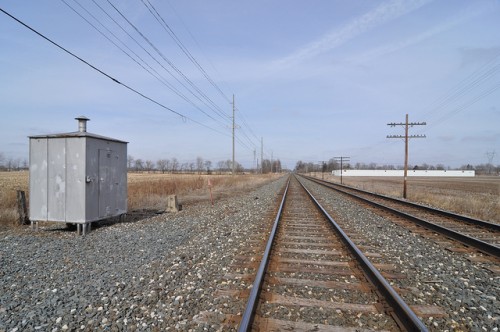 An interesting blog post over at Portland Transport recently got my gears turning. The post in question, put to the test the argument that nearly ALL road expansion projects tout the ability to be able to move freight quickly and efficiently. The post also points out that freight does not always win out, yet if we look at recent discretionary funding, we can see that the Federal government awarded stimulus money to upgrading private railroad infrastructure. Also, there is talk of truck only lanes across the Midwest that seems to be gaining some steam.
An interesting blog post over at Portland Transport recently got my gears turning. The post in question, put to the test the argument that nearly ALL road expansion projects tout the ability to be able to move freight quickly and efficiently. The post also points out that freight does not always win out, yet if we look at recent discretionary funding, we can see that the Federal government awarded stimulus money to upgrading private railroad infrastructure. Also, there is talk of truck only lanes across the Midwest that seems to be gaining some steam.
Given that American manufacturing has been on the decline for years, are we putting our eggs in the right basket? As our country moves from a more manufacturing based economy to a service & technology based economy, efficiently moving people will continue to grow more important. To be sure about this, until our government starts aggressively taxing it out of existence, off-shooring will continue for manufacturing, as well as some technology sectors. As this occurs, exporting goods will become less important. The big question is, will moving imports become less important? There will always be products to move, but will we reach an inflection point where our desire to consume goods and their associated movement exceeds our need to prioritize shipping those goods over moving people?
Moreover, should we continue to use this as the basis and justification for ALL transportation projects? When does political action catch up with economic trends and moving people to important jobs within a city, or between cities, become a priority over freight shipment?
I have asked a lot of questions here which I do not necessarily have an answer. But it did get me thinking and I am curious as to what other readers may think.
These are complicated questions, and I am not even going to pretend that I know the answers, but I will offer a few general observations.
I believe moving goods will only grow in importance. However, moving goods is a continous improvement process. This has not always been the case, but ever since the “invention” of a container (I actually just started reading a very interesting book on this topic), moving goods has become a very efficient process. Some companies like Amazone will likely improve this process even more – shipping goods to customers directly from a factory to their home (taking just-in-time inventory to the extreme). Anyway, I think it will become more important for some obvious reasons — growth in population, increase in online shopping, technological/productivity improvements will make more goods accessible to more people, etc. As a sidenote – a man who is rarely wrong, Warren Buffett, recently added to his huge investment (bet) in a railroad company. He sees a strong rail system as key to future US growth.
Although I wish that moving people will become more important in the future, I am not so sure about that trend. The second wave of outsourcing will hit more white-collar service jobs (some lawyer/paralegal work replaced with smart software, accounting and engineering being outsourced to India/China, etc). In addition, technological improvements make it possible for more and more people to work from home, and conduct meetings online. The good thing is that if more people can do work from home, they might choose neighborhoods that are walkable and have more content. However, I am not sure that we will need to move more people over longer distances.
I agree with JP. Trains can move goods in to us, and may well be more important in the global era. It’s prohibitively expensive to fly a container of low-value goods (say, toys) to Indiana. But it’s cheap to ship it by cargo ship and rail to a break-bulk facility in Plainfield that serves the entire Midwest.
.
That’s one of the reasons I argue for conversion of underutilized rail or factory space to a multimodal (i.e. container-processing) facility. We’ve got big railyards on the west and east side of Indy; the ones on the east side are near the closed Citizens Gas Coke plant and the underutilized Harvester facility. And the GM plant is right on a rail line, and nearly adjacent to the interstate: perfect for an intermodal transfer point.
Although rail is much cheaper than air freight I doubt many people ordering goods online will ever get used to waiting weeks for a shipment to come in. A less efficient system of air freight will likely become more and more popular thanks to the internet. This may end up being a good thing and create more demand for high speed rail which would then help people also move from place to place faster.
On a picky note… Our economy is “Technically” not becoming based on “service and technology” it is “research and development” which should bring in higher paying jobs and require higher education levels than our prior economy. An economy based on service will slowly lose all of its cash due to buying imports in order to provide those services. We need the R&D on top to make sure we are at the top of the food chain along with natural resources. I have knowledge beyond that on the matter, but this is what I understood from my Micro-Economics professor.